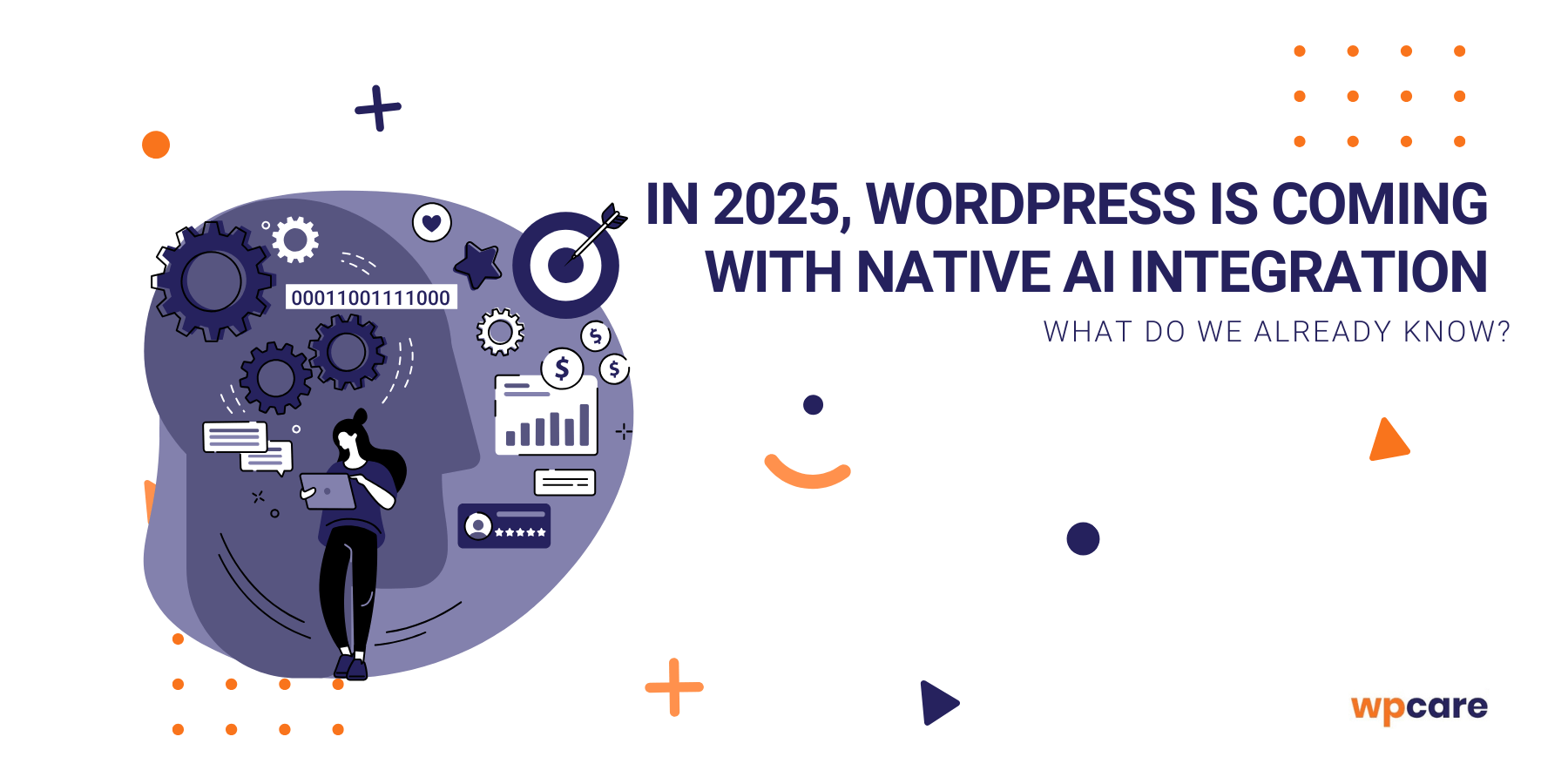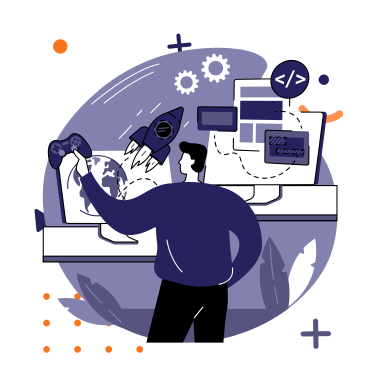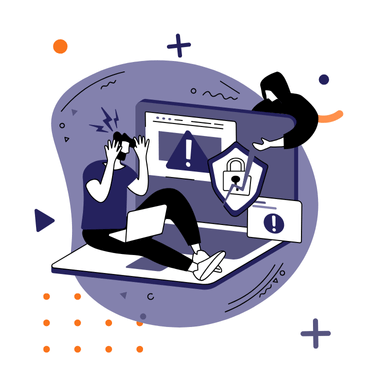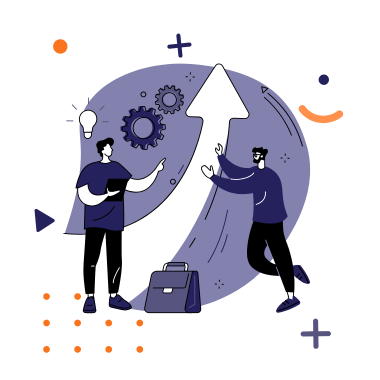Creating websites in WordPress can be time-consuming. Content, SEO, images, structure – all of it requires time, knowledge, and constant adaptation to user expectations and algorithms. That’s exactly why the upcoming changes could revolutionize the way you build and manage your website.
In 2025, WordPress is introducing native integration with artificial intelligence. This isn’t just another plugin – it’s a set of deeply integrated AI features designed to make life easier for website owners, marketers, and content creators. If you want to create faster, better, and more effectively – this is for you.
What do we know about this revolution so far? What specific tools will appear in your dashboard? And how can you prepare for the change ahead? Find out – because WordPress is entering the AI era.

Native AI integration with WordPress – where does this move come from?
Just a few years ago, AI in WordPress was an add-on. Now it’s becoming a necessity. Why? Because users expect simplicity, automation, and fast results – and the competition isn’t sleeping.
Market pressure and the rise of competitors
Wix, Shopify, Webflow – all of these platforms have been offering built-in AI features for months. A user types a few sentences and gets a ready-made website. Meanwhile, WordPress, though the most powerful and flexible, still requires manual work – templates, plugins, configurations.
For many, this is a barrier. For WordPress – a wake-up call.
In response to these changes, WordPress has decided to act. An official AI team has been appointed with one goal: to restore WordPress’s edge through intelligent automation.
The automation trend
More and more users don’t want to “manage a website” – they want results. Fast. Without technical know-how. That’s why AI is becoming crucial:
- generates content,
- adapts SEO,
- designs pages,
- optimizes UX.
Automation is no longer an advantage – it’s an expected standard.
To maintain its market dominance, WordPress must deliver what others already do – but better and with more flexibility.
The role of OpenAI, Google, and other giants
It’s no coincidence that AI has gone mainstream. Tools like ChatGPT, Gemini, and Claude have become part of everyday workflows for marketers, copywriters, and business owners.
What’s more – the same users who use AI in their Google Docs, emails, or Canva projects now expect similar support within WordPress.
Tech giants have set new standards. WordPress has to keep up – or lose the fight for simpler projects.
What AI features are coming to WordPress?
WordPress will no longer be just a system for manually creating content. In 2025, AI will become its native “co-author”. Here are the key features that will be delivered to users:
- Content generation: you write a post title, and AI suggests a draft, structured with headings and a ready meta description. Content can be tailored to your industry style, brand tone, or target audience.
- Translations and localizations: not just automatic translation, but contextual adaptation of content for various markets – e.g., industry-specific terminology in DE or EN (UK vs US).
- Editing and style assistant: AI will suggest what to shorten, expand, simplify, or rewrite. It can also rephrase the text for a different audience on demand.
- Image and ALT text generation: instead of searching stock images, AI will generate illustrations for posts or products – complete with SEO-friendly and accessibility-compliant alt text.
- SEO assistant: AI will automatically analyze headings, keyword density, suggest internal links, and flag technical issues in your content.
- Content personalization: based on user data (location, behavior, traffic source), AI can dynamically change messages on the site – no coding required.
- Data and UX analysis: AI-driven suggestions on which content works, what to improve, and how to shorten the user’s conversion path.
How will it be implemented?
WordPress doesn’t want to create just another closed plugin. Instead, it will develop an open and flexible AI layer aligned with open-source principles.
Canonical plugins
The most important AI features will be developed as official WordPress plugins – so-called canonical plugins. They’ll be maintained and supported by the core team, but remain optional.
This means:
- you install only what you need,
- you’re assured compatibility with future WP versions,
- you know what’s going on “under the hood”.
LLM client abstraction
WordPress won’t tie itself to a single AI provider. Instead, it’s building an abstraction layer that lets you choose the model – e.g., OpenAI, Claude, Gemini, or even your own local server.
Integration with the block editor (Gutenberg)
AI will be available where you work:
- dedicated blocks (e.g., “Generate product description”),
- suggestions in the sidebar panel,
- smart tips while writing.
Compliance with Open-Source Philosophy
- Full transparency.
- Local processing capability (in the future).
- You control what data is sent to external models.
Summary
If you use WordPress, the changes announced for 2025 are more than just an update — they mark the beginning of a new way to work with content and websites. The native AI integration has one goal: to simplify your daily tasks, reduce content creation time, improve efficiency, and help you focus on what truly matters — delivering value to the user.
You don’t need to be a developer or AI expert to use it. The new features will be integrated into the editor, available as simple tools, and aligned with how you already work in WordPress. At the same time, you won’t lose control — you choose what to activate and how much you want to rely on AI.
This isn’t a “someday” promise — these are concrete actions already underway. WordPress is entering a new era, and you can be part of it. Because AI is not here to replace you. It’s here to help you work faster, smarter, and more effectively.
And that’s exactly why it’s worth preparing now.
Need help with your WordPress?
From managing updates, performance, and backups — we take care of your site so you can focus on growing your business.
Contact us—we’re here to help!



